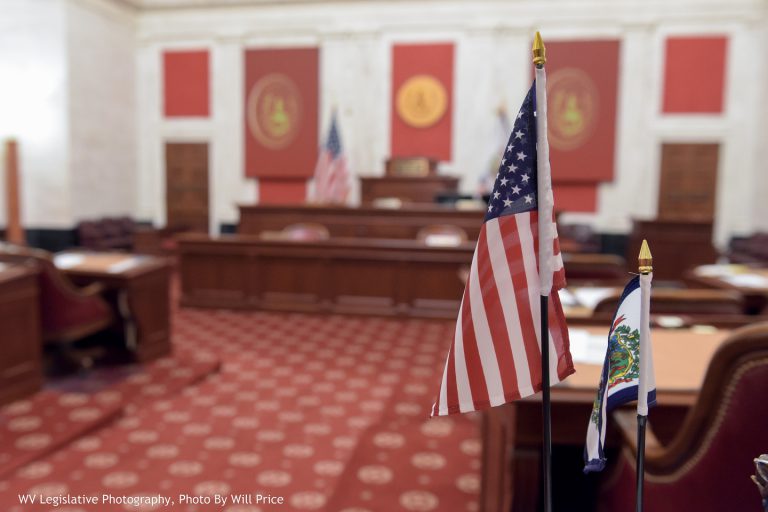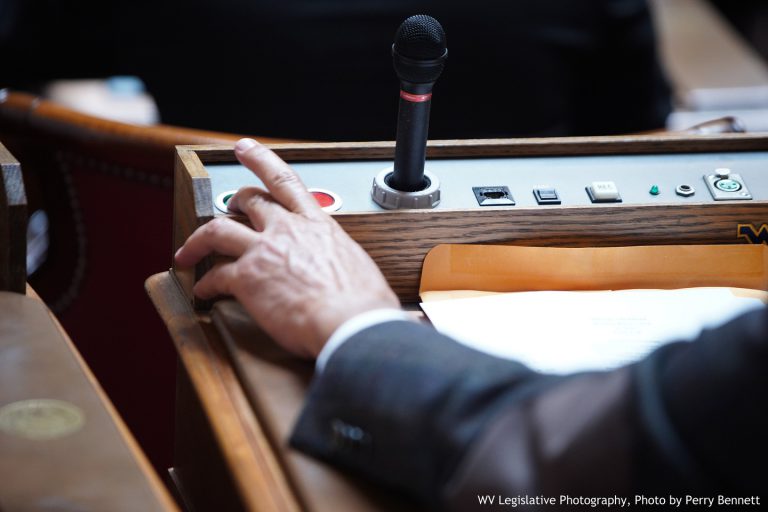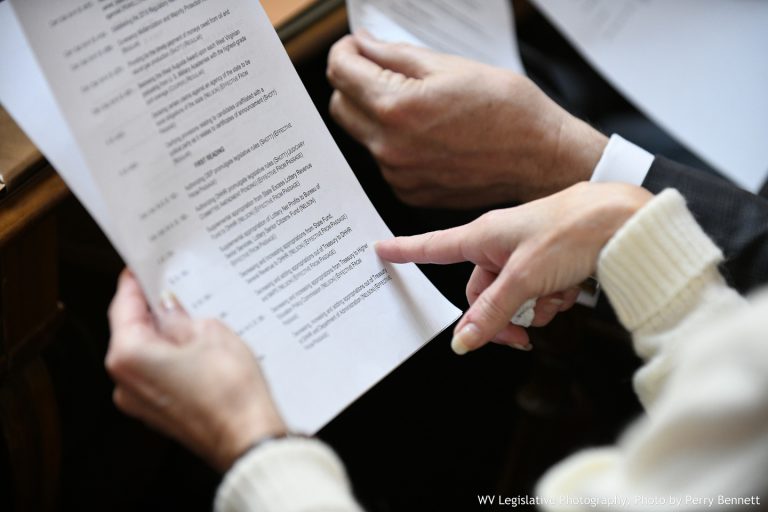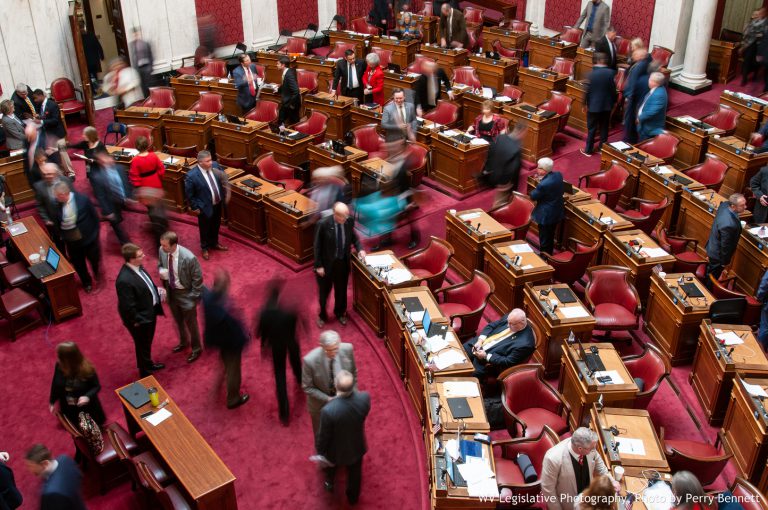Women’s Day in Legislature, Farm Bureau, Firefighters Honored in House
Representatives for Women’s Day in the Legislature, WV State Firemen Association, and Farm Bureau and Forestry Association were recognized by members of the House today.
The House introduced two concurrent resolutions. One of these resolutions was House Concurrent Resolution 34 which would request that the Joint Committee on Government and Finance study a four day work week consisting of ten hour days for city, county and state employees.
There were three bills on third reading, today. These bills include House Bill 4075, which would allow a video recording device monitoring system during Amber Alerts, House Bill 4328, which would exclude the service of a poll worker from being considered as a prohibited political activity, and House Bill 4344, which would enforce minimum requirements relative to tethering or chaining animals which are intended to protect animals from cruel treatment. These bills passed and now will be considered in the Senate.
There were 14 bills that were also introduced, bringing the total number of House bills introduced this session to 1080.
The following committees will meet today:
Industry & Labor – 1:00 p.m. – 215E
Roads & Transportation – 2:00 p.m. – 215E
Political Subdivisions – 3:00 p.m. – 215E
Health & Human Resources – 4:00 p.m. – 215E
The following committees will meet tomorrow, February, 6:
Education – 9:00 a.m. – 432
Education – 1:30 – 432
Education Subcommittee B – following Education meeting at 1:30 – 432
Senior Issues – 4:00 p.m. – 215E
The House will reconvene at 11:00 a.m. Thursday, February 7.
First Bill Completes Legislative Action
The first bill to complete legislative action during the 2008 Regular Session was passed today. House Bill 2517 will give the Board of Banking and Financial Institutions the authority to approve acquisitions of out-of-state banks by West Virginia state banks.
There were no bills on first or second reading on the Senate Calendar today, however fourteen new bills were introduced. Senate Bill 586 was introduced today and would authorize pharmacists to dispense prescriptions remotely and administer immunizations.
There have been 596 bills total introduced in the Senate this session.
The following committees will meet today:
Natural Resources Committee – 1:00 p.m. – 208W
Pensions Committee – 1:15 p.m. – 451M
Government Organization Committee – 2:00 p.m. – 208W
Finance Subcommittee A – 3:00 p.m. – 451M
Judiciary Committee – 3:00 p.m. – 208W
The following committees will meet tomorrow:
Finance Subcommittee B – 9:30 a.m. – 451M
Judiciary Committee – 10:00 a.m. – 208W
The Senate will reconvene at 11:00 a.m. tomorrow.
In the Senate
As of 4 p.m., Wednesday, February 6, the 21st day of the 78th Legislature, 596 bills have been introduced in the Senate. Of these, a total of 16 have passed the Senate and will go to the House for its consideration. Some of the bills that have passed this week include:
Senate Bill 217 would reduce the length of time that must occur before a magistrate or municipal court must notify the Division of Motor Vehicles regarding unsatisfied traffic-related tickets of nonresidents. Parking tickets would not fall under “traffic-related” tickets. If a non-resident fails to respond or appear in court after being charged with a traffic violation, after 80 days the municipal or magistrate court would be able to report this individual to the Division of Motor Vehicles, which would then be able to suspend the privileges of the nonresident driver.
Senate Bill 292 would allow bond claims by the Commissioner of Banking to collect unpaid civil administrative penalties and examination invoices. This bill would also require that consumer claims be resolved before any payments may be made for the unpaid penalties or examination invoices.
A Sampling of Bills Introduced In the Senate
Senate Bill 508 would authorize the state boards of examination or registration to conduct criminal background checks through the Federal Bureau of Investigations on applicants and current licensees.
Senate Bill 510 would require the Whitewater Commission to produce an annual report containing statistics such as the number of fatalities and injuries occurring during whitewater river use.
Senate Bill 513 would allow approved pharmacists to administer hepatitis A, hepatitis B, influenza, pneumonia and tetanus immunizations to individuals 18 years of age or older. The pharmacist would have to have completed a course, established by the Board of Pharmacy, on immunization administration. The board would be required to approve treatment guidelines established by a physician, including how to spot an adverse reaction to an immunization. The pharmacist would also be required to complete an American Red Cross or American Heart Association course to become certified in life-support training.
Senate Bill 516 would allow emergency medical services personnel, certified emergency medical technician-basic or at a higher level of training, to administer the drug epinephrine to a person suffering an allergic reaction or anaphylaxis.
Senate Bill 527 would create the Restroom Access Act. This act would require retail establishments with private restrooms to allow access to individuals with certain medical conditions or who utilize an ostomy device if a public restroom is not readily available. Any retail establishment or employee that violates these provisions would be guilty of a misdemeanor and fined no more than $100.
Senate Bill 544 would establish a pilot program within the West Virginia Health Information Network to promote electronic data sharing. This pilot program would involve at least two hospitals, which would use existing sources of electronic health information to achieve clinical decision support.
Senate Bill 548 would require that all United States and West Virginia state flags that are purchased with state dollars be manufactured in the United States.
Senate Bill 549 would require West Virginia to provide health insurance for workers on public improvement projects. These public improvement projects would be defined as construction which may be let to contract by the state, including projects which are wholly or partially funded by public funds.
Senate Bill 556 would place limitations on towing companies involved in the towing of vehicles without the consent of the motor vehicle operator or owner. For example, if a vehicle were being towed from private property, without the vehicle owner or operator’s consent, the towing company would be required to obtain written authorization from the owner of the private property from which the vehicle was towed. Upon reaching the towing destination, the towing company would also be required to notify local law enforcement of the personal articles in the motor vehicle involved in the tow, as well as the make, model and license plate number of the vehicle.
Senate Bill 566 would make it a felony offense to have any involvement in, whether it be managing, financing, conducting or betting on an animal fighting venture. Violators would be guilty of a felony, fined between $1,000 and $5,000, imprisoned for no less than one year, or both.
Senate Bill 568 would establish the “Green Buildings Act,” which would call for the adoption of green building standards for the construction and renovation of public buildings over 50,000 square feet in size.
Senate Bill 573 would increase public school teachers’ and service personnel annual salaries. The bill would also call for a $400 annual bonus for teachers with less than 20 years experience, and a $1000 annual bonus for teachers with over 20 years of teaching experience.
Senate Bill 583 would require any director, or member of a board of directors for a non-profit organization which receives state or federal funding, to complete at least three hours of training in the administration and operation of non-profit organizations. The state or federal agency that provides funding to the non-profit organization would be responsible for providing the training. Any person required to complete this training would be reimbursed for any expenses incurred during the training.
Senate Bill 586 would give licensed pharmacists the authority to remotely dispense and deliver prescription drugs. Patients would be able to be counseled by a licensed pharmacist via the telephone or video link. This bill would also give qualified pharmacists the authority to give flu shots.
Senate Bill 591 would prohibit smoking in and on the grounds of medical facilities. Medical facilities would be required to post signs, written in English and Spanish, informing people of this prohibition. Any person who does not comply would be guilty of a misdemeanor, and would be fined between $50 and $500 for each separate offense.
Senate Bill 594 would reduce school violence and disorderly conduct by creating a Bill of Rights for Students and School Personnel. This bill would require county boards of education to hold meetings with parents, students, school employees and other interested individuals regarding effective disciplinary actions. The bill specifies that counties must hold these meetings in varying locations in order to increase attendance.
In the House
As of 4 p.m., Wednesday, February 6, 2008, the 29th day of the 2008 Regular Session, 1080 bills have been introduced in the House. Of those, 12 have passed the House this week and have gone to the Senate for its consideration. These include:
House Bill 2711 would allow fire officers to use adjacent properties to prevent fire from spreading.
House Bill 3122 would include those who served honorably in the National Guard and reserves to be defined as eligible veterans. Those persons would then be considered eligible for training programs that provide qualification for employment.
House Bill 4016 would update the meaning of “federal adjusted gross income” and certain other terms used but not defined in the West Virginia Personal Income Tax Act by bringing them into conformity with their meanings for federal income tax purposes.
House Bill 4017 would update the meaning of “federal taxable income” and certain other terms used but not defined in the West Virginia Corporation Net Income Tax Act by bringing them into conformity with their meanings for federal income tax purposes.
House Bill 4021 would revise mining safety equipment requirements by no longer requiring strobe lights be attached to certain self-rescue devices. The bill would also enhance penalties for crimes against mining property. It would be considered a felony with a punishment of a fine up to $50,000 or up to 5 years in prison if a person damages or destroys any property owned or operated by a mining company.
House Bill 4052 would establish an advisory council on maternal risk assessment within the Office of Maternal, Child and Family Health to develop a uniform maternal risk-screening tool to serve medical care providers in the assessment of high-risk pregnancies. This uniform screening tool would assist with better and more measurable data regarding at-risk and high-risk pregnancies.
House Bill 4053 would protect computer owners and users from unsolicited and fraudulent offers from unsolicited pop-up electronic mail known as spyware. People receiving these offers would be able to contact the attorney general to file complaints.
House Bill 4075 would provide for a video recording device monitoring system during Amber Alert periods. These video recording devices would be used for surveillance of vehicles to assist in the recovery of abducted children during an Amber Alert.
House Bill 4099 would allow vehicles designated by the Secretary of the Department of Military Affairs and Public Safety for emergency response by the Division of Corrections, Regional Jail and Correctional Facility Authority and Division of Juvenile Services to use red flashing lights.
House Bill 4125 would increase the faculty senate funds available to classroom teachers and librarians. Each teacher and librarian would be allotted $100 dollars for expenditures during the instructional year for academic materials and supplies.
House Bill 4328 would exclude the service of a poll worker from being considered a prohibited political activity. This bill amends West Virginia Code that relates to favoritism or discrimination because of political or religious opinions, affiliations or race and political activities.
House Bill 4344 would add minimum requirements relative to tethering or chaining animals, including the length and weight of chains or tethering devices and providing shelter to protect them from elements of weather that are intended to protect animals from cruel treatment. Any person who is found guilty of cruelly and intentionally mistreats an animal would be subject to fines and removal of the animal. This bill does not apply to acts of hunting, fishing, trapping or animal training or farm livestock, poultry, gaming fowl or wildlife kept in private or licensed game farms.
A Sampling of Bills Introduced In the House
House Bill 4346 would exempt schools that include grades kindergarten through grade 12 from paying consumer sales tax on items the school sells.
House Bill 4352 would allow teachers who graduated from colleges and universities that are not accredited by associations recognized in West Virginia, to obtain a teaching certificate based on their certification in another state.
House Bill 4368 would create a Bill of Rights and Responsibilities for Students and School Personnel, School Discipline Committee and a series of county-wide meetings. Chronically disrupted students would be placed and isolated in alterative learning centers that would be created through the county school boards. The county school boards would be responsible for creating committees to evaluate progress and action taken against disruptive students.
House Bill 4388 would authorize the West Virginia Supreme Court of Appeals to maintain a domestic violence database containing certified copies of protective orders entered by the courts.
House Bill 4393 would allow members of the State Teachers Retirement System to repay a maximum of three years worth of contribution back into the system. Any member who left the state for a teaching opportunity and subsequently returns to a teaching position within West Virginia, may purchase credited service for the time he or she was absent from the state.
House Bill 4408 would eliminate the use of light plastic bags in retail establishments. These establishments would be required to participate in a recycling program and provide compostable bags and recycling bins.
House Bill 4427 would qualify children of state employees and persons employed in West Virginia with an annual income of $25,000 a year or less for the West Virginia Children’s Health Insurance Program (WVCHIP).
House Bill 4435 would exempt vehicles in a funeral procession from paying a toll on the West Virginia Turnpike. The vehicles would have to be clearly identifiable as participants in the funeral procession.
House Bill 4443 would create the offense of carrying, using or possessing a firearm or other destructive device during the commission of a drug related crime. If a person were found carrying a weapon, they would be sentenced to up to five years in prison.
Completed Legislative Action (Week of Jan. 30 – Feb. 6, 2008)
House Bill 2517 gives the Board of Banking and Financial Institutions the authority of to allow West Virginia banks to acquire out-of-state banks. A West Virginia bank must file with the commissioner, a copy of the application made to the appropriate federal regulator before it can acquire an out-of-state bank or an out-of-state bank holding company. The exception is if the acquisition involves a merger of a bank with and into a West Virginia bank.
By Counting Steps, State Lawmakers Stride Toward Wellness

The Legislature is committed to encouraging West Virginians to become physically active and involved in programs that support healthy lifestyles. That is why the WalkingWorks Capitol Challenge has become a part of the 2008 Regular Session. This friendly competition between members and staff of the Governor’s Office, House of Delegates and Senate has advocated healthier lifestyles in the Mountain State since 2007. The competition includes over 200 participants this year.
WalkingWorks has been under way since January 21st and will continue until March 2nd. Participants use a pedometer to keep track of the number of steps taken each day. Every week, the individual who has walked the most steps is recognized on the House and Senate floors as the “Highest Stepper.”
“Since this program has started, I personally have seen tremendous growth and interest in it,” said Delegate Don Perdue, chairman of the House Health and Human Resources Committee. “This program is especially important in trying to improve our health and a crucial part of this program is leading by example. Our aim is not to impress healthy lifestyles upon our constituents without doing so ourselves. I hope more people, both at the Capitol and around the State, take appropriate steps to leading a healthier lifestyle.”
When the 6-week program ends, awards will be presented to the person who has walked the most number of steps, the most improved and the oldest walker, and a trophy will be given to the team that has the highest average steps.
According to Trust for America’s Health Web site, West Virginia had the second highest rate of adult obesity and second highest rate of overweight youth (ages 10-17) in 2007. In addition, 26.2 percent of West Virginia adults reported that they engaged in no physical activity compared to the national average of 22 percent. There is also a strong correlation between obesity and increased blood pressure, diabetes, heart disease, stroke, arthritis, colon cancer and hypertension – all risks that could be reduced through regular exercise and a balanced diet.
While there isn’t one single answer to help the fight against obesity, there are many steps, including legislation, that can be taken to decrease it little by little. The Legislature is participating in the WalkingWorks program at the Capitol to act as healthy role models, and continues to work on legislation to help ensure a healthier future for West Virginia’s citizens.
“We need to change the mindset of people and I think the way we do that is by example. If we are going to talk the talk, then we need to walk the walk,” said Senator Roman Prezioso, chairman of the Senate Health and Human Resources Committee. “It’s important for Legislators to set an example and be good role models. They want to go out in their communities and talk about health care, but they need talking points and an example to start with. This program is a great way to do that. WalkingWorks works!”
Legislators and Capitol staff are taking a stand against obesity by taking daily steps to improve their health – and encouraging all West Virginians to pursue a healthier life.
Hurricane High School Choir, Band, Athletes Honored in House
Members of the House issued citations to members of the Hurricane High School Red Hot Show Choir and various athletic teams for their hard work and dedication and for their accomplishments in the last year.
The House introduced four concurrent resolutions and one joint resolution. House Joint Resolution 16 would increase the homestead exemption from $20,000 to $30,000. House Resolution 17 was also introduced today and would expresses support for West Virginia University Institute of Technology and the institution’s revitalization and continued presence in Montgomery, West Virginia.
There was one bill on third reading, today. House Bill 4032 would allow the payment of wages made through a direct deposit system using an automated teller machine card or other means of electronic transfer. The bill was passed and will now be considered in the Senate.
Three bills were on second reading. These bills include House Bill 4075, which would allow a video recording device monitoring system during Amber Alerts, House Bill 4328, which would exclude the service of a poll worker from being considered as a prohibited political activity, and House Bill 4344, which would enforce minimum requirements relative to tethering or chaining animals which are intended to protect animals from cruel treatment.
The following committees will meet today:
Finance – 1:00 p.m. – 460M
Judiciary Subcommittee A – 1:00 p.m. – 410M
Government Organization – 1:30 p.m. – 215E
Judiciary Subcommittee C – 2:00 p.m. – 410M
Education – 2:00 p.m. – 432M
Education Subcommittee B – 3:00 p.m. – 432M
Banking & Insurance Subcommittee A – 4:00 p.m. – 252
Senior Citizens Issues – 4:00 p.m. – 215E
The following committees will meet tomorrow, February, 5:
Homeland Security – 9:00 a.m. – 460M
Banking & Insurance – 10:00 a.m. – 215E
Pensions – 10:00 a.m. – 460M
Industry & Labor – 1:00 p.m. – 215E
Roads & Transportation – 2:00 p.m. – 215E
Health & Human Resources – 4:00 p.m. – 215E
The House will reconvene at 11:00 a.m. Wednesday, February 6.
Senate Hears Performance by Marshall’s Marching Thunder
Members of the Senate heard a performance from members of Marshall’s Marching Thunder today.
Senate Bill 275 and House Bill 2517 were on second reading in the Senate today. Senate Bill 275, similar to House Bill 2517, was re-committed to the Committee on Banking and Finance. House Bill 2517 was advanced to third reading.
There were 16 bills introduced in the Senate today. Senate Bill 573 would increase the annual salaries of public school teachers and service personnel. Senate Bill 574 would increase State Police compensation.
The following committees will today:
Health and Human Resources Committee – 2:00 p.m. – 208W
Banking and Insurance Committee – 2:00 p.m. – 208W
Education Committee – 2:00 p.m. – 451M
Judiciary Committee – 2:45 p.m. – 208W
Finance Subcommittee A – 3:00 p.m. – 451M
The following committees will meet tomorrow:
Labor Committee – 9:00 a.m. – 208W
Energy, Industry and Mining Committee – 10:00 a.m. – 208W
Natural Resources Committee – 1:00 p.m. – 208W
Pensions Committee – 1:15 p.m. – 451M
Government Organization Committee – 2:00 p.m. – 208W
The Senate will reconvene at 11:00 a.m. tomorrow.
“Almost Heaven” Resolution Adopted in House
Members of the House adopted House Concurrent Resolution 27, which would designate “Almost Heaven — West Virginia — Wild and Wonderful” as the official roadway welcome slogan of the State of West Virginia. The resolution will now be sent to the Senate for its consideration.
The House passed three bills today. These bills were House Bill 2711, which would allow fire officers to use adjacent property to prevent a fire from spreading; House Bill 4052, which would develop a uniform maternal risk screening tool to serve as an alert to medical care providers in evaluation and assessment of high-risk pregnancies; and House Bill 4099, which would allow vehicles designated by the Secretary of the Department of Military Affairs and Public Safety for emergency response by the Division of Corrections, Regional Jail and Correctional Facility Authority and Division of Juvenile Services to use red flashing lights.
The House adopted Senate Concurrent Resolution 34, which amends the Joint Rules of the House and the Senate. The resolution adds Joint Rule 32, which relates to petitions regarding county commissions.
The following committees will meet today:
Health and Human Resources Subcommittee B – 12:30 p.m. – 252
Government Organization – 1:00 p.m. – 215E
Finance – 1:45 p.m. – 460M
Education – 2:00 p.m. – 432M
Judiciary – 2:00 p.m. – 410M
Joint Judiciary & Finance – 3:00 p.m. – House Chamber
Health and Human Resources – 4:00 p.m. – 215E
Senior Citizens Issues – 4:00 p.m. – 215E
The following committees will meet tomorrow, February, 4:
Finance – 9:00 a.m. – 460M
Health and Human Resources – 9:00 a.m. – 215E
Judiciary – 9:00 a.m. – 410M
Government Organization – 1:30 p.m. – 215E
Judiciary Subcommittee C – 2:00 p.m. – 410M
Banking & Insurance – 4:00 p.m. – 252
The House will reconvene at 11:00 a.m. Tuesday, February 5.





